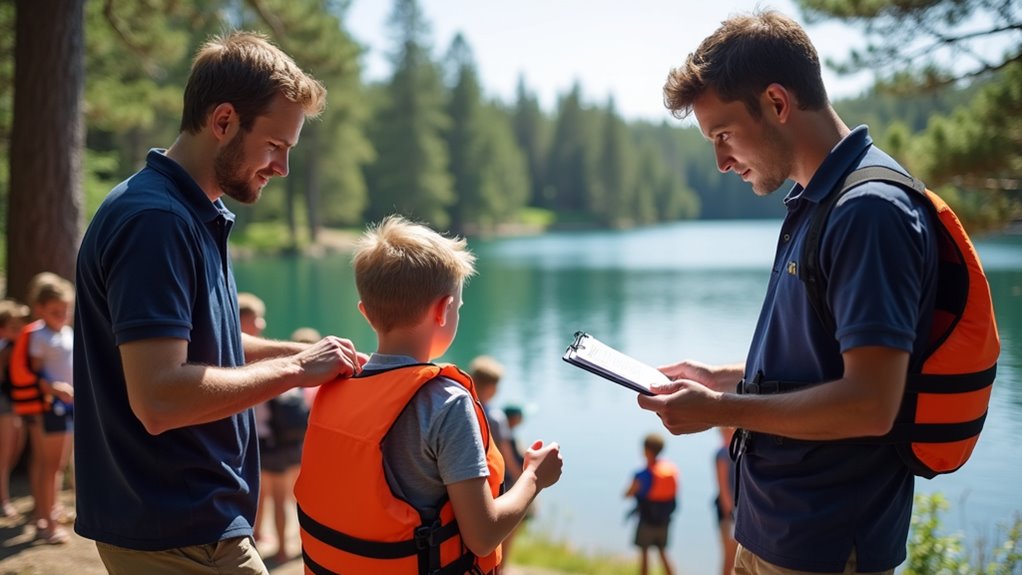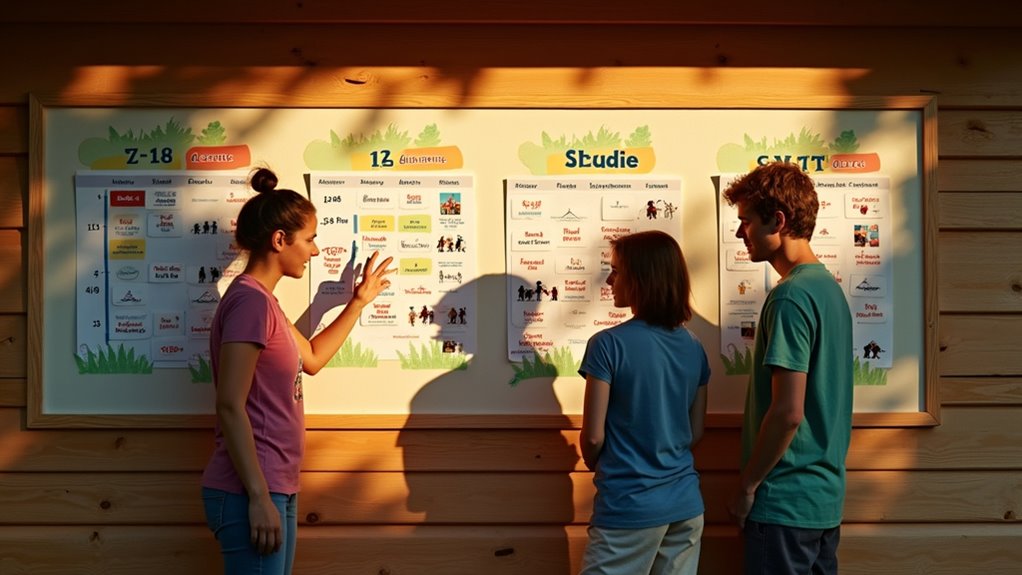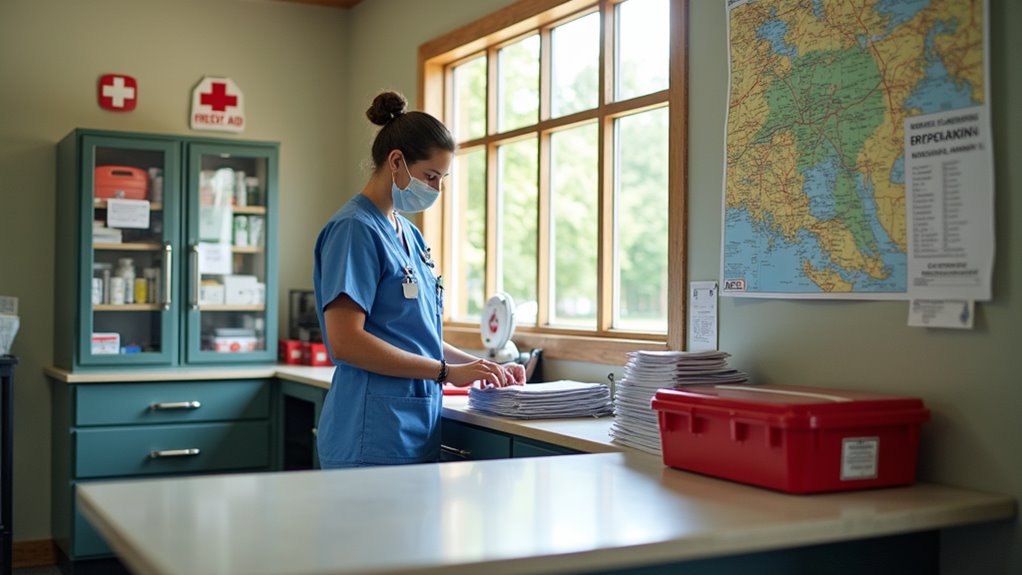Physical Address
304 North Cardinal St.
Dorchester Center, MA 02124
Physical Address
304 North Cardinal St.
Dorchester Center, MA 02124

Choose the perfect summer camp for your child with expert tips on safety, activities, and financial planning that most parents overlook.
When you’re searching for the perfect summer camp for your child, you’ll need to navigate through countless options and considerations. From ensuring excellent safety protocols to finding activities that match your kid’s interests, the selection process can feel overwhelming. Don’t let your budget constraints limit your choices too quickly—many quality camps offer financial aid options. Let’s explore the essential factors that’ll help you make an informed decision for your child’s unforgettable summer experience.

Five key areas deserve careful attention when researching a summer camp’s safety record and reputation.
First, verify ACA accreditation, which guarantees the camp meets established safety and quality standards through regular inspections.
ACA accreditation ensures camps maintain high safety standards and undergo consistent quality inspections to protect campers’ wellbeing.
Second, examine their safety record by requesting incident logs and speaking with past camp families about their experiences.
Don’t overlook online reviews and parent testimonials on third-party sites for unbiased feedback. High numbers of returning campers often signal a trustworthy program. Consider that most popular camps host between 100-1,000 campers annually due to their proven track records.
Plus, investigate their child abuse prevention measures, including staff-to-camper ratios and background check policies.
Finally, review their emergency preparedness plans and medical staff qualifications. Make certain they’ve clear procedures for handling crises and maintaining open communication with parents.
Ask about their insurance coverage and staff certifications in CPR and first aid.
When evaluating a summer camp’s staff, you should aim to focus on their age requirements, certifications, and professional development opportunities.
Look for camps where at least 80% of counselors are 18 or older, and make certain they’re at least two years older than your child’s age group. Many camps prioritize hiring counselors who have specialized activity skills to enhance program quality.
Ask about the staff’s required certifications, particularly CPR and First Aid.
Verify that the camp conducts thorough background checks and provides detailed training in emergency procedures and child safety protocols.
You should inquire about their staff retention rates – a return rate of 40-60% typically indicates a positive work environment.
Don’t hesitate to ask about ongoing staff development programs.
Camps that invest in their staff’s professional growth through ACA certificate courses and continuing education often deliver higher quality programs and better supervision for your child.

Beyond staffing considerations, your child’s engagement and growth at summer camp depends heavily on well-matched activities and age groupings.
Look for camps that divide children into age-appropriate cohorts, guaranteeing your child interacts with peers at similar developmental stages.
Age-appropriate groupings ensure children make meaningful connections while learning and growing alongside peers at similar developmental levels.
Check that the camp’s daily schedule includes a balanced mix of physical, creative, social, and cognitive activities.
For ages 3-5, make certain there’s plenty of sensory play and imaginative activities.
If you’ve got older kids, seek programs offering skill-building workshops and more challenging sports activities.
Don’t forget to verify safety protocols for each activity level.
The camp should use age-appropriate materials and maintain proper supervision ratios.
Some children thrive in mixed age groups while others perform better with same-age peers.
Ask about how they modify activities for different age groups and whether they offer both structured and free-choice options.
Location plays a pivotal role in your summer camp selection, directly impacting both convenience and costs. You’ll need to choose a camp within manageable driving distance to reduce daily commute stress and guarantee quick access during emergencies.
Consider traffic patterns, peak hours, and whether the location offers safe drop-off points or shuttle services. The camp should demonstrate values in action through its safety protocols and transportation arrangements, reflecting their commitment to camper well-being.
When evaluating potential camp locations, focus on these key factors:
Don’t forget to factor in location-related expenses like transportation costs, parking fees, and any additional charges for shuttle services when planning your budget.

Three key financial considerations shape your summer camp selection: base tuition, additional expenses, and available aid options.
Day camps typically cost $50-$500 per week, while overnight camps range from $1,000-$2,000 weekly. About 93% of camps provide some form of financial assistance for families in need. You’ll find more affordable options through non-profit organizations and public parks, where fees run $50-$300 per week.
Expect to pay $50-500 weekly for day camps and up to $2,000 for overnight camps, with non-profits offering more budget-friendly rates.
Don’t forget to factor in extra costs like transportation, meals, and required gear.
To maximize savings, look for early bird discounts, sibling rates, and multi-session pricing. Many ACA-accredited camps offer scholarships or sliding scale fees based on your income.
You’ll also find payment plans to help spread costs over time. Research local camps first, as they often provide better value and eliminate transportation expenses.
While selecting a summer camp, carefully evaluating its diversity and inclusion policies will guarantee your child experiences a welcoming environment that celebrates differences.
Look for camps that demonstrate a commitment to DEI through their mission statements, staff training programs, and recruitment efforts. You should aim to confirm the camp actively works to remove access barriers and provides inclusive programming that represents various cultural identities. With 76 million school-age children in the United States deserving quality camp experiences, inclusive environments are more important than ever.

Ensuring your child’s safety at summer camp starts with a thorough evaluation of the camp’s medical facilities and emergency protocols. Verify that the camp has a state license and meets all regulatory requirements from the Department of Health Services. In Coconino County, camps must be licensed by ADHS, while other counties require licensing through their health departments.
Safety first: Thoroughly check camp medical facilities, emergency protocols, and state licensing before sending your child to summer camp.
Look for camps with on-site medical professionals, particularly pediatric nurses, and an equipped infirmary. Ask about required medical documentation, including health history forms, immunization records, and physical examination requirements.
Don’t forget to check the camp’s proximity to hospitals – ideally within 60 minutes for advanced care. The camp should have clear emergency response plans and trained staff in first aid and CPR.
For children with special medical needs, confirm that appropriate medical support is available 24/7 and that medication administration protocols are in place.
Before enrolling your child in summer camp, carefully examine the daily schedule and overall structure to confirm it aligns with your family’s needs and your child’s interests.
Look for camps that offer a balanced mix of activities, including sports, arts, and educational programs, while providing essential breaks for meals and rest. Most quality camps incorporate weekly themes that guide activity selection and keep children engaged throughout their stay. Consider whether the camp offers flexible drop-off and pick-up times that work with your schedule.
You’ve done all the research, checked every credential, and analyzed countless programs to find the perfect summer camp for your child. Yet, ironically, your kid might end up loving the simplest aspects – like making s’mores or singing silly songs – more than those carefully vetted activities. Don’t let the detailed planning overwhelm you; while safety and budget matter, sometimes the best memories come from unexpected moments.